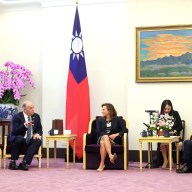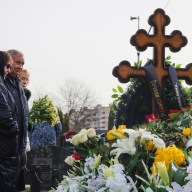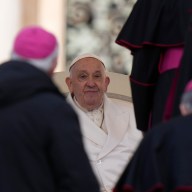BAGHDAD – Sports has been one of the few things unifying Iraqis in recent years – with soccer victories bringing Shiites, Sunnis and Kurds alike into the streets cheering.
But a bitter fight between the government and the country’s Olympic committee and sports federations is putting Iraq at risk of being banned from World Cup qualifying matches and this summer’s Olympic Games in Beijing.
The feud is mired in politics. The government accuses the National Olympic Committee of corruption, while supporters of the group charge that officials really want to control the independent sports groups so they can install their own people in lucrative and prestigious posts.
But there is also an underlying layer of Iraq’s sectarian bitterness: The Youth and Sports Ministry is dominated by Shiites, while the Olympic committee includes four holdovers from the Sunni-dominated regime of Saddam Hussein, whose feared son Odai ran the panel.
Four other members of the National Olympic Committee, including its chief, were kidnapped nearly two years ago and there has been no word on their fate. At the time, some Iraqis accused Shiite militiamen, though there is no public evidence the abduction was connected to the sports dispute.
The power struggle came to a head last week when Iraq’s government ordered the dissolution of the National Olympic Committee, arguing it was illegitimate because it could not reach a quorum since the kidnappings and was involved in financial wrongdoing.
The International Olympic Committee denounced the order as “serious interference” in what is supposed to be an independent body and demanded the government respect the Iraqi committee’s autonomy.
FIFA, the governing body of world soccer, banned the Iraqi soccer federation from international play for a year unless the Olympic committee’s dissolution is rescinded by Thursday. If it stands, the ban will keep Iraq’s national team out of qualifying matches for the 2010 World Cup, including a game against Australia scheduled for Sunday in Brisbane.
The spokesman of an interim National Olympic Committee installed by the government, Jazair al-Sahlani, said Tuesday that the decision “is firm and will not be reconsidered.”
The IOC’s executive board is to discuss the situation when it meets in Athens, Greece, next week but has not said what steps it might take if Iraq doesn’t give in.
The disbanded committee’s head, Bashar Mustafa, said the government order makes it unlikely Iraq will be able to participate in the Beijing Olympics this August or the World Cup in two years.
“Depriving our Olympic and national teams of world championships will have a negative effect on the Iraqi people, who patiently look forward to such events to forget their sufferings,” he said.
Last July, Iraqis erupted with joy when the national soccer team – the Lions of the Two Rivers – won the Asia Cup. Sunnis, Shiites and Kurds poured into blast wall-lined streets to celebrate, shooting guns in the air and talking about a common Iraqi pride.
Now many worry they may be robbed of one of their few diversions, one that makes them feel connected with the outside world.
“Sports is the only way left for Iraqis to communicate with others. We don’t care who leads it,” said Jalal Mahdi, a 30-year-old who has a mobile phone shop in Baghdad’s Baladiyat district. He said the government should nullify its order. “All we care about is that sports goes on.”
Adnan Hameed, a teacher in the New Baghdad district, said he suspects there were problems inside the disbanded committee. But “the timing of decision was not good – better to wait until after Beijing,” the 45-year-old said.
The government argues the 11-member Olympic committee was not legitimate because it could not reach a quorum after the kidnapping of the four members and the resignation soon after of two others. It said the temporary committee, made up of lawmakers and experts, will sit until elections for a new panel are held in three months.
Al-Sahlani, the interim panel’s spokesman, said the disbanding was also ordered because of “financial issues that fall in the government’s authority” – a reference to corruption allegations, though he would not elaborate.
Members of the disbanded committee accuse the Youth and Sports Ministry of long trying to take over the National Olympic Committee and the independent sports federations.
Mustafa, the head of the disbanded group, accused government officials of seeking to put “people affiliated to powerful political parties” on the committee and “change its independent identity.” He said there “is no corruption case at all.”















